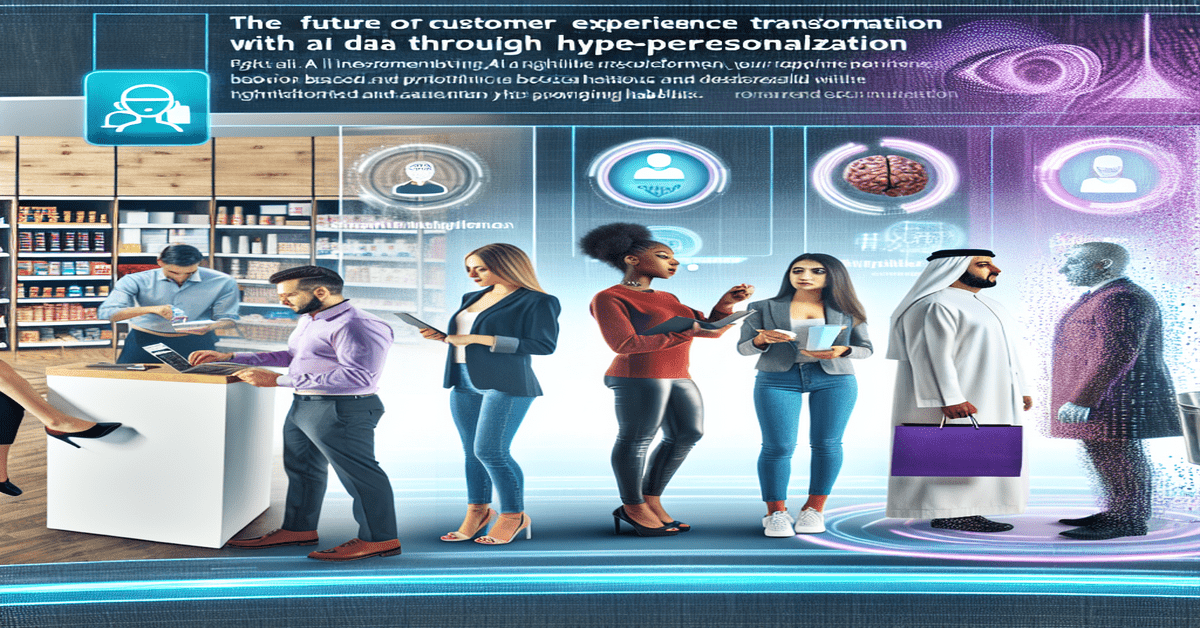The AI Revolution: Hyper-Personalization and the Future of Customer Experience
In today’s fast-paced, digital-first world, businesses are constantly seeking ways to stand out from the competition and create lasting connections with their customers. As AI and data analytics continue to advance at an unprecedented rate, a new era of hyper-personalization is emerging, transforming the way companies interact with and engage their audience.
The Power of Hyper-Personalization
Hyper-personalization is the use of AI and real-time data to create highly tailored, relevant, and dynamic customer experiences. By analyzing vast amounts of customer data, such as browsing behavior, purchase history, social interactions, and intent, AI systems can predict and deliver personalized content, product recommendations, and communications that resonate with each individual customer.
The impact of hyper-personalization on business outcomes is significant. According to recent studies, hyper-personalized experiences are expected to generate up to 40% more revenue for retailers by 2025, with 80% of consumers more willing to buy from companies offering such personalization. This highlights the immense potential of AI-driven personalization in driving customer engagement, loyalty, and ultimately, revenue growth.
AI-Driven Personalization Across Industries
The applications of AI-driven personalization extend across various industries, each leveraging the technology to enhance customer experiences in unique ways:
Retail
In the retail sector, AI is being used to recommend products that customers may not even realize they want, based on their past purchases, browsing history, and preferences. By anticipating customer needs and desires, retailers can enhance conversion rates and customer satisfaction, creating a more engaging and personalized shopping experience.
Healthcare
AI is revolutionizing the healthcare industry by enabling the creation of personalized treatment plans based on patients’ medical history, genetics, and lifestyle factors. By leveraging AI to analyze vast amounts of patient data, healthcare providers can improve treatment outcomes, enhance care efficiency, and deliver a more patient-centric approach to healthcare.
Banking
In the banking industry, AI is being employed to suggest financial products and services that align with individual customers’ spending habits and financial goals. By providing personalized recommendations and insights, banks can foster stronger customer relationships, increase customer loyalty, and drive revenue growth.
The Role of Real-Time Data and Automation
One of the key enablers of hyper-personalization is the ability to analyze customer interactions and behaviors in real-time. AI systems continuously process vast amounts of data, allowing businesses to automate the creation of relevant content, product suggestions, and communications, such as personalized marketing messages and AI-powered chatbots.
This real-time, automated approach to personalization creates seamless, individualized customer experiences that foster loyalty and retention. By delivering the right message or recommendation at the right time, businesses can demonstrate their understanding of each customer’s unique needs and preferences, building trust and strengthening the customer-brand relationship.
The Business Imperative of Hyper-Personalization
In today’s competitive landscape, customers have come to expect personalized interactions as a standard of service. Failure to deliver on these expectations can lead to frustration, disengagement, and ultimately, the loss of customers to competitors who are better equipped to meet their needs.
As such, AI-driven hyper-personalization is no longer an optional strategy, but an essential one for companies wanting to sustain customer relationships and boost conversion rates in the digital age. By investing in AI and data analytics capabilities, businesses can position themselves to thrive in an increasingly personalized and customer-centric market.
The Future of AI and Customer Experience
As AI continues to evolve, we can expect to see even more sophisticated applications of the technology in the realm of customer experience. Some of the key trends to watch include:
1. **AI-powered emotional intelligence:** AI systems will become increasingly adept at recognizing and responding to customer emotions, enabling more empathetic and human-like interactions.
2. **Voice and speech recognition:** The growing popularity of voice assistants and chatbots will drive further advancements in AI’s ability to understand and respond to natural language, creating more seamless and intuitive customer experiences.
3. **Predictive analytics and generative AI:** As AI becomes more sophisticated in its ability to analyze data and generate content, businesses will be able to deliver even more personalized and anticipatory experiences, predicting customer needs and desires before they even arise.
Embracing the AI-Driven Future
In conclusion, the future of customer experience is undeniably intertwined with the advancement of AI and data analytics. As businesses continue to embrace these technologies and leverage them to deliver hyper-personalized experiences, they will be better positioned to build lasting customer relationships, drive revenue growth, and thrive in the digital age.
By staying attuned to the latest trends and best practices in AI-driven personalization, and by investing in the necessary tools and talent to implement these strategies effectively, companies can unlock the full potential of hyper-personalization and set themselves apart in an increasingly competitive landscape.
#Personalization #CustomerExperience #ArtificialIntelligence
-> Original article and inspiration provided by Analytics Insight
-> Connect with one of our AI Strategists today at ReviewAgent.ai


